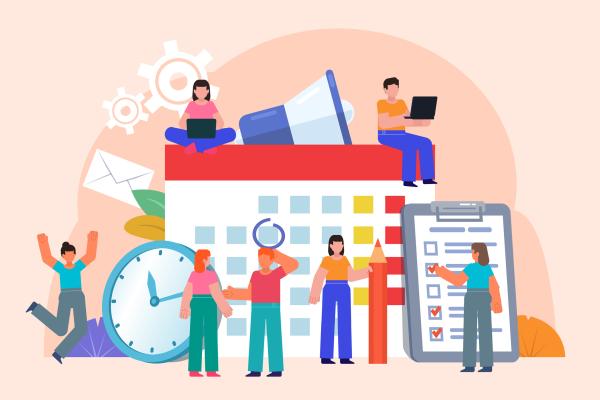When you set out to plan a new program for your library, you likely think about content first. What information will you cover? What will the program be named? What are your goals, and how will you achieve them based on your budget and resources? This is the process we have come to know as “program planning.”

Then there are the logistics. Where will your program be held? What sort of seating do you need for the accessibility needs and comfort of your patrons? How will you take attendance, take questions, and keep folks hydrated?
This second set of questions falls into the category of “event planning,” another important skillset for programming librarians — and one that is rarely taught in MLIS programs or formal professional development offerings.
How can library instructors prepare their students for the event-planning aspects of librarianship? We asked members of ALA’s 21st-Century Librarians Task Force to recommend exercises that could be used to teach library-specific event planning.
Exercise 1: Attend real events
There is no substitute for firsthand experience, so we recommend that library students attend a virtual or in-person program at a local library. During the program, they should observe audience engagement, How is it captured? Is the audience encouraged to respond verbally, or in the case of virtual programming, in chat?
Take note of branding in the space. What, specifically, occurs to identify the organization providing the program? What about post-event program evaluation? Do the event's closing remarks encourage attendees to offer feedback or participate further?
Students can then speak with the planner to learn what did and didn’t work and write an evaluation of the program, offering suggestions of what they would do differently.
Exercise 2: Create project management plans
To brush up on the organizational skills involved with event planning, students should create project management plans for a variety of event types and sizes.
Plans could incorporate existing library policies and requirements, and include current professional competencies and expectation. Plans should include items that are actually measurable, not things that are aspirational. For example, you might note that program materials were successfully translated into the three languages spoken by community members, or that an ASL interpreter and live captioning were available during an online program. The project management plans should also include emergency and contingency measures and incorporate the tenets of cultural competence and social justice.
Exercise 3: Conduct a community analysis
Lastly, students should complete a community analysis. The analysis will help to determine who is in the community (and who in the community are not using the library) and what programs they need and want. The book ”Assessing Information Needs: Managing Transformative Library Services: Managing Transformative Library Services” by Robert J. Grover, Roger C. Greer, and John Agada is a good reference on the topic.
How did you learn the event-planning skills that you use on the job? Tell us in the comments.
Nicole A. Cooke is the Augusta Baker Endowed Chair and an associate professor at the School of Library and Information Science at the University of South Carolina. Tammy Baggett is director of the Durham County Library in Durham, North Carolina. Skills for 21st-Century Librarians: Task Force for the Development of a NILPPA-Informed Programming Librarian Curriculum was made possible in part by the Institute of Museum and Library Services grant number RE-246421-OLS-20.
Read the next blog in the "Skills for 21st-Century Librarians series, "Knowing Your Community': What It Really Means for Programming Librarians."



